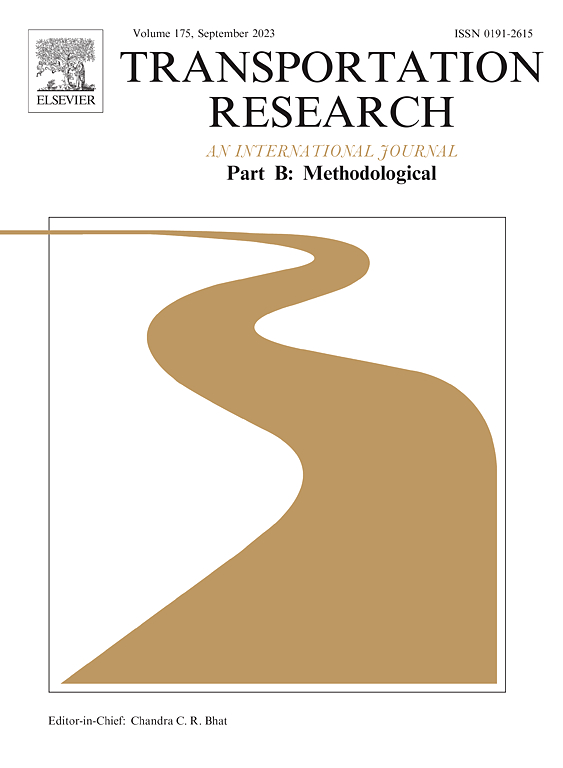Order dispatching strategy and pricing scheme in ride-sourcing markets with consideration of service cancellation
IF 6.3
1区 工程技术
Q1 ECONOMICS
引用次数: 0
Abstract
In a ride-sourcing system, dispatching order requests to available drivers entails a comprehensive consideration of factors such as pickup proximity, order rewards, driver rating, safety behavior, passenger preferences, real-time road conditions, and other relevant variables. Inefficient dispatch processes often result in service cancellation by either the customer or the driver. This paper represents a pioneering effort to examine order dispatching strategy and pricing scheme while taking service cancellation behaviors into account. By assuming the platform has limited knowledge of the valuation of service of each customer and the reservation earning rate of each driver, we develop a two-period model that captures the dynamic decision-making processes of multiple stakeholders (customers, drivers, and platform) and formulate the platform’s order-dispatching problem as a stochastic programming model. Within a greedy approximation framework, our analysis reveals the significant implications of pricing scheme for critical performance metrics while considering service cancellation. These include the matching probability (probability of customer-driver acceptance for platform’s match results), the platform’s rewards, and the effects on the platform’s order-dispatching decisions. Specifically, within the realm of linear pricing, the matching probability demonstrates a positive correlation with trip distance, and thereby establishes a consistent dispatching order compared with one that does not consider service cancellation. Conversely, with nonlinear pricing (whether sublinear or superlinear), extended trip distance is generally associated with a reduced matching probability when it exceeds a threshold; this results in prioritizing orders with intermediate trip distances in order-dispatching decisions. Moreover, numerical experiments support that an integration of sublinear, superlinear, and linear pricing is conducive to optimizing rewards across short-, intermediate, and long-distance trips. Finally, scenarios of unimodal distributions of customer’s valuation of service and driver’s reservation earning rate consistently yield the highest rewards, through sublinear, linear, and superlinear pricing schemes.
考虑服务取消的约车市场订单调度策略及定价方案
在叫车系统中,将订单请求发送给可用的司机需要综合考虑各种因素,如取车距离、订单奖励、司机评级、安全行为、乘客偏好、实时路况以及其他相关变量。效率低下的调度过程常常导致客户或司机取消服务。本文开创性地研究了考虑服务取消行为的订单调度策略和定价方案。通过假设平台对每个客户的服务估值和每个司机的预订收益率的了解有限,我们开发了一个两期模型,该模型捕捉了多个利益相关者(客户、司机和平台)的动态决策过程,并将平台的订单调度问题制定为随机规划模型。在贪婪近似框架内,我们的分析揭示了在考虑服务取消时,定价方案对关键性能指标的重要影响。其中包括匹配概率(客户驱动程序接受平台匹配结果的概率)、平台的奖励以及对平台订单调度决策的影响。具体而言,在线性定价领域内,匹配概率与行程距离呈正相关,从而与不考虑服务取消的调度顺序相比,建立了一致的调度顺序。相反,对于非线性定价(无论是亚线性还是超线性),当行程距离超过阈值时,行程距离的延长通常与匹配概率的降低有关;这导致在订单调度决策中优先考虑具有中间行程距离的订单。此外,数值实验支持亚线性、超线性和线性定价的整合有助于优化短途、中程和长途旅行的奖励。最后,通过次线性、线性和超线性定价方案,客户对服务的评价和司机预订收益率的单峰分布场景始终产生最高的奖励。
本文章由计算机程序翻译,如有差异,请以英文原文为准。
求助全文
约1分钟内获得全文
求助全文
来源期刊
CiteScore
12.40
自引率
8.80%
发文量
143
审稿时长
14.1 weeks
期刊介绍:
Transportation Research: Part B publishes papers on all methodological aspects of the subject, particularly those that require mathematical analysis. The general theme of the journal is the development and solution of problems that are adequately motivated to deal with important aspects of the design and/or analysis of transportation systems. Areas covered include: traffic flow; design and analysis of transportation networks; control and scheduling; optimization; queuing theory; logistics; supply chains; development and application of statistical, econometric and mathematical models to address transportation problems; cost models; pricing and/or investment; traveler or shipper behavior; cost-benefit methodologies.

 求助内容:
求助内容: 应助结果提醒方式:
应助结果提醒方式:


